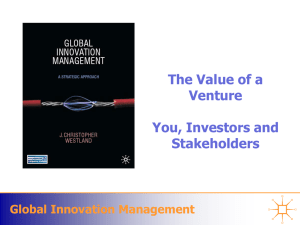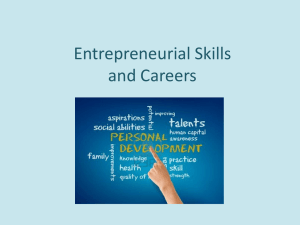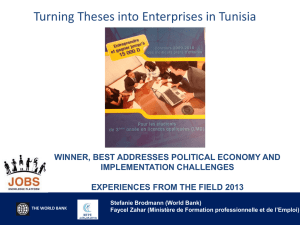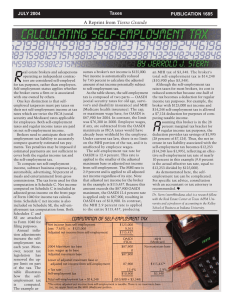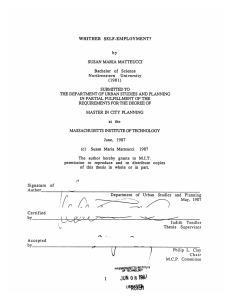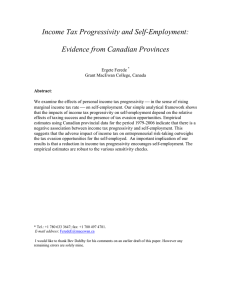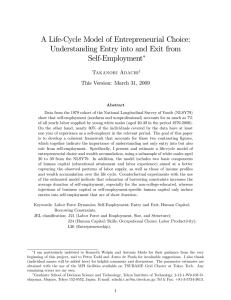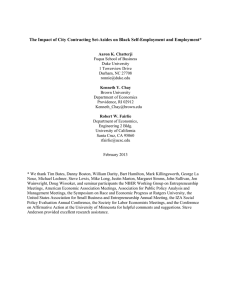Tools for Assessing Self-Employment Readiness
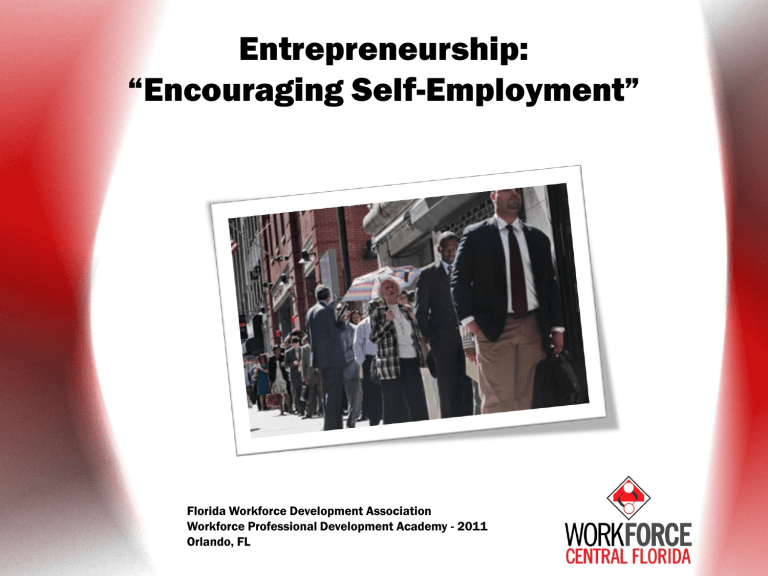
Entrepreneurship:
“Encouraging Self-Employment”
Florida Workforce Development Association
Workforce Professional Development Academy - 2011
Orlando, FL
OBJECTIVES
• To explore options for better serving the unemployed who might prefer to start their own business (self-employment).
• To outline suggestions for how One-Stop Career
Centers can introduce self-employment focused services/activities.
• To describe ways Center Staff can encourage self-employment.
OVERVIEW
• Approach & Induction Practices
• Placement Success Factors that Honor
Entrepreneurship as a Career Choice
• Developing One-Stop Career Centers that
Encourage Self-Employment
• Tools for Assessing Self-Employment Readiness
• Training, Coaching & Mentoring Entrepreneurs
• Researching Essential Business Information
• Local Organization Collaboration
Approach & Induction Practices
– Initial Assessment
– Résumé Assistance
– Job Interviewing
– Job Search Planning
– Staff Assisted Job Match
– Job Referrals
– Job Development
– Employment Referral
A key question that should be asked is “whether or not the option of selfemployment is offered in each of these steps”.
Self-employment Focused Services or
Activities
• Provide an introductory letter that suggests experiences the unemployed could find locally to prepare for creating a small business as opposed to taking any job that is available.
• Use a self-employment assessment or entrepreneurship checklist as part of the assessment process. One such assessment was developed from the Entrepreneurship Technical
Competency Standards from the
United States DOL Competency
Model.
• Send those interested in selfemployment to an information interview with an existing business owner.
• Provide a list of community resources and web sites that might improve the unemployed person‘s decision-making regarding self-employment.
Placement Success Factors that Honor
Entrepreneurship as a Career Choice
• Entry into unsubsidized employment
• Retention in unsubsidized employment six months after entry into the employment
• Earnings received in unsubsidized employment six months after entry into the employment
• Attainment of a recognized credential relating to achievement of educational skills, which may include attainment of a secondary school diploma or its recognized equivalent, or occupational skills, by participants who enter unsubsidized employment
• Customer satisfaction for participants
• Customer satisfaction for employers
Additional Performance Indicators that
Recognize Self-employment:
• Use of entrepreneurial intake assessment process
• Participation in training, mentoring, and coaching to develop entrepreneurial skills
• Participation in double major programs (developing both entrepreneurial skills and specific technical skills)
• New business starts as documented by the following:
– New business license and registration
– Lease or deed for place of business
– Business plan as validated by community support system
– Business financial records
– Self-certification of hours spent on business
– List of customers
– New business starts supported by external investors
• Clients moved from welfare roles to taxpayers as business owners
Developing One-Stop Career Centers that
Encourage Self-Employment
• If self-employment is to be promoted effectively, then One-
Stop Career Centers must feature that option in signs, displays, mailings, Web pages, and other appealing and prominent visual aids.
• Effective graphics, consistent branding of the concept, and repeated exposure in a visual format increase the likelihood that the idea of starting a business will catch on among the unemployed, and that Center staff will be accountable for promoting the option.
Developing One-Stop Career Centers that
Encourage Self-Employment
• Daily we receive all types of visual messages related to conservation that remind us to be wise users of our resources, from the gasoline in our cars to the water coming out of our taps.
• When options for employment are limited, as they are now, a strong marketing message about self-employment may open the eyes of job seekers to their own best ideas.
Tools for Assessing Self-Employment
Readiness
Research with first-time business owners reveals five distinct stages that entrepreneurs go through as they advance their business ideas. The five stages are:
• Discovery: The entrepreneur generates ideas, recognizes opportunities, and determines the feasibility of ideas, markets, ventures, etc.
• Concept Development: The entrepreneur plans the venture, identifies needed resources using a business plan, identifies strategies to protect intellectual property, etc.
• Resourcing: The entrepreneur identifies and acquires the financial, human, and capital resources needed for the venture startup, etc.
• Actualization: The entrepreneur operates the venture and utilizes resources to achieve its goals and objectives.
• Harvesting: The entrepreneur decides on the venture‘s future—growth, development, or demise.
Training, Coaching, and Mentoring
Entrepreneurs
• When entrepreneurial skill development is needed, there are typically many partners in a region that can provide the training. WIB staff must communicate frequently in order for partners to coordinate services effectively for individual clients or groups.
• WIBs need partners who can assist entrepreneurs at each of the five stages of development providing
help with:
Training, Coaching, and Mentoring
Entrepreneurs
• Analyzing business ideas
• Facilitating access to local opportunities and resources, including financing
• Connecting business owners with suppliers and contractors
• Helping established businesses advance to the next level
Researching Essential Business
Information
•
Federal web site (www.business.gov) is designed to provide a wealth of resources that local One-Stop Career
Centers can access to help their clients.
•
Center staff should be familiar with a great variety of web sites that can provide specific local data helpful to the unemployed.
•
These web resources may be identified by economic development organizations, small business assistance centers, trade associations, and education/training organizations.
Local Organization Collaboration
Creating Trusting
Partnerships
Interactions that Support an
Entrepreneurial Climate
• Each community has a variety of organizations that can choose to work together, merging resources, networks, funding options, etc.
• WIB staff members should co-sponsor community events and activities that enhance the alignment of WIB's strategic priorities and projects.
• Such partnerships need to identify individual benefits and agreements in order to establish an environment of trust and provide needed services to the community without competition or unnecessary duplication.
• Through these opportunities to work with like-minded organizations, staff members often find partners who operate with a priority for action projects with no fear of failing, always seeking a better way to serve clients.
Local Organization Collaboration
Defining Partners’ Roles and Support Systems
• Because there is so much work to be done to support entrepreneurship in each community, it is essential that the strategic planning and strategic doing by WIB focus on critical strategies to create an entrepreneurial climate as well as support entrepreneurs in the region.
• Once the strategies are identified, it is essential to work with partners who desire to participate so that the work can be done without undue duplication of services.
• Once partners are on board, joint action planning can be done between
WIB and the partners, allowing partners to decide who will spearhead specific projects and how they will collaborate on common projects.
• On joint projects, partners must openly discuss who will own a common project, who will share the project, and who will ignore the project, making clear the role of each partner while the work is underway.
Questions & Answers
Facilitated by:
Shirley A. Walker,
MBA, PMP
WORKFORCE CENTRAL FLORIDA
Special Projects Coordinator
Florida Workforce Development Association
2011 - Workforce Professional Development Academy
Orlando, FL
Reference Source:
Think Entrepreneurs: “A Call To Action”
A study by The Consortium of Entrepreneurship Education
